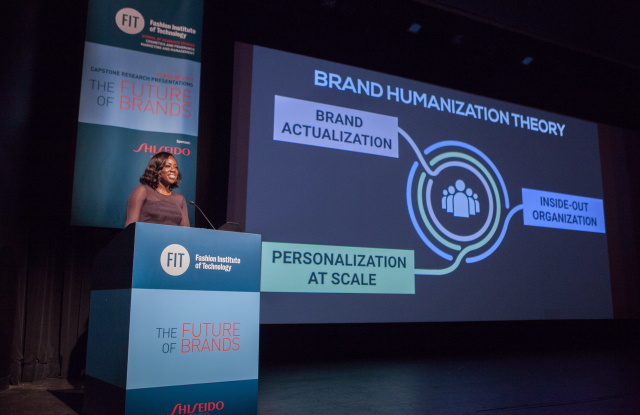FIT Cosmetics & Fragrance Marketing Graduates Home in on Well-being – WWD
Fashion Institute of Technology’s 2020 graduating class in the Master of Professional Studies program in cosmetics and fragrance marketing and management has presented the findings of its two capstone research projects.
Given digitally, the capstone presentations were affected by the coronavirus pandemic beyond just change in venue, as the research shifted form while the pandemic evolved. “It was clear that we had to consider the impact of COVID-19, and think about how consumers’ changing mentalities are going to need to be embraced by our industry,” said Brianna Picciuto, co-leader of the second research group and brand manager, Unilever.
Both capstone projects centered around well-being, with group one looking internationally at how countries measure success, and group two examining the U.S. market and the interactions with adjacent industries.
On an international level, group one developed a metric to measure a country’s success, taking into account factors like health care, safety, economic prosperity and social norms. The newly developed scorecard is meant to replace GDP.
After compiling separate rankings across several factors outside of economics, group one concluded that the four main factors to be considered are health care, safety, economy, and social values when determining a country’s success. Nicol Martin, from group one’s creative team, and global marketing director at Revlon, Inc., pointed to Denmark’s universal health care and broadening societal conversations around mental health as an example of the group’s policy recommendations.
Another key policy recommendation was ensuring a community-minded safety net for citizens provided by the government, pointing to New Zealand’s strong welfare policies, Martin said. She also noted that high corporate taxes, as seen in central and Eastern Europe, as well as Scandinavian countries, had pros like larger allocations to education programs. Lastly, group one’s recommendations included mandated limited work hours and thorough paid leave for workers. “These types of policies, as they relate to work-life balance, can really reduce stress levels and increase the health of a citizen,” she said.
Domestically, group two examined the American health-care system alongside the strategies that have worked for breakout brands in the beauty and wellness spaces. The group’s objective was “to really understand the current state of the health-care system, how consumer behavior is changing, as especially being heightened by COVID-19, and what sort of evolving consumer behaviors are looking like,” said Leanne Hug, co-leader of group two and team lead in trade marketing at CoverGirl U.S.
Stemming from the findings, Hug said, an overhaul of the American health-care system is overdue. “It’s going to take a lot of efforts, not just from the health-care industry, but also the wellness industry and the beauty industry,” said Picciuto. “So our major overarching prediction is that all three of these industries will merge into one, and that will have a profound impact on how we structure the beauty industry in particular to get ready for this convergence.”
The three primary areas of focus for group two included corporate culture, emphasized approaches to education, and shapeshifting product categories. “Instead of hair care, skin care and cosmetics, consumers are going to start to think in two distinct categorizations: essential and nonessential,” Hug said. “That really is brought on by the way people are thinking about the industry and our categories through the coronavirus pandemic, based upon their necessity.”
Other predictions include beauty and pharmaceutical M&A’s, and an integrated approach to retail with heightened roles for beauty advisers, and narrower gaps between mass and prestige categories. “The speed at which these predictions will be coming to life has just increased because of COVID, and the onset of some of these social issues that have risen in the past few months,” Hug added.
The graduating class includes Naira Aslanian, category insights, Johnson & Johnson; Sara Bickerman, marketing, Fresh, LVMH; Samantha Bort, omni marketing, L’Oréal; CJ Browne, CRM and data, L’Oréal; Caterina Burzio, marketing, Beiersdorf USA; Alexandra Cassar, scent design management, IFF; Marissa Cassidy, marketing, The Estée Lauder Cos. Inc.; Megan Greenhalgh, brand management, Unilever; Adriana Harmon, marketing, L’Oréal USA; Leanne Hug, trade marketing, Coty Inc.; Jessica Luc, marketing – fine fragrance, Symrise; Katarzyna Lugowska Akduran, development, L’Oréal USA; Nicol Martin, global marketing, Revlon; Amelia Peng, global business development, LVMH; Nicole Perry, marketing, Parfums Christian Dior; Brianna Picciuto, brand management, Unilever; Allison Pollack, marketing, the Estée Lauder Cos. Inc.; Laura Reilly, account management, Firmenich; Karishma Sharma, transformation PMO, the Estée Lauder Cos. Inc.
For more from WWD.com, see:
Categories, Channels Blur in Beauty
Target’s Digital Sales Surge During the Coronavirus Pandemic

